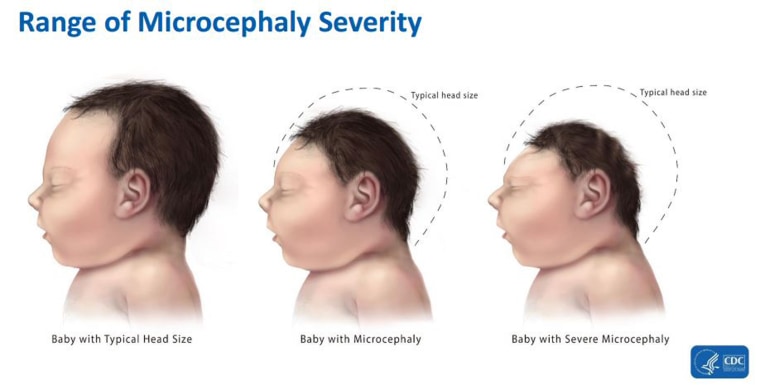The case of a Brazilian woman whose unborn baby died may show that Zika is causing even worse birth defects than feared, doctors reported Thursday.
The fetus had virtually no brain at all, and died seven months into the pregnancy, the doctors reported.
An autopsy showed Zika in the brain of the fetus but nowhere else in the body — a finding that supports what other doctors have found. Zika seems to pile up in the brains of babies killed by birth defects.
Perhaps even more worrying, the 20-year-old mother did not remember having had a Zika-like illness. That raises the possibility that the virus can cause birth defects even when it doesn’t make the mother sick.
"The first indication of an abnormal pregnancy was the ultrasound finding of intrauterine growth retardation in the 18th gestational week," Dr. Albert Ko of Yale University and colleagues wrote in their report, published in the Public Library of Science journal PLoS Neglected Tropical Diseases.
Related: Zika Found in Brain of Fetus With Severe Defect
The fetus was much smaller than it should have been. Later ultrasounds showed the fetus had hydranencephaly, a condition in which much of the brain is missing and fluid is there instead.
"The whole brain was filled with liquid," Ko told a recent meeting of researchers. The area around the lungs and in the chest was also filled with liquid.
Other doctors have found Zika in the bodies of babies that miscarried and in amniotic fluid – clear evidence the virus is passing from mother to child in the womb, and that it can kill the fetus.
“The whole brain was filled with liquid."
“Given the recent spread of the virus, systematic investigation of spontaneous abortions and stillbirths may be warranted to evaluate the risk that Zika virus infection imparts on these outcomes,” Ko’s team wrote.
Zika is spreading fast across the Americas and the World Health Organization and Centers for Disease Control and Prevention have both warned pregnant women to avoid countries where the virus is circulating.
Brazil has reported a worrying rise in cases of a birth defect called microcephaly, caused when the developing brain is damaged by an infection, alcohol poisoning or a genetic condition.

CDC, WHO and Brazilian experts are fanning out across the worst-hit areas, comparing healthy babies to babies with microcephaly to see if they can pin down Zika as the cause.
One puzzling question is why it would be causing birth defects in Brazil when it has not been known to cause birth defects before – and the virus has been identified since 1947.
Experts say it could be this is the first really big epidemic of Zika, hitting a big country with 3 million births a year for the first time. Or it could be that in the densely populated slums where Zika is hitting hardest, people get bitten multiple times by the mosquitoes that spread it and get super-intense infections, Ko and colleagues write in a second research paper published Wednesday.
It could be that the virus has mutated just a bit, they added in their commentary published in the Annals of Internal Medicine.
“Unfortunately, the immediate prospects for controlling the magnitude and spread of the current Zika virus epidemic are not promising,” they wrote.
"Until a vaccine is available, mosquito control and education of at-risk populations to reduce contact with the vector are the only short-term approaches available. These methods have had limited success for dengue and chikungunya viruses."

